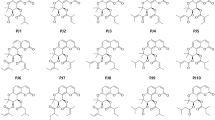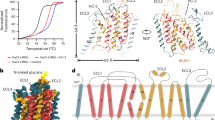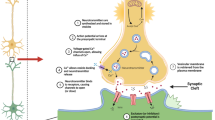Abstract
IT has been shown by Adams and Whittaker1–4 that both forms of mammalian cholinesterase hydrolyse aliphatic esters, those of 3 : 3-dimethyl-butanol (I), the carbon analogue of choline (II), being particularly rapidly hydrolysed. Thus human2 and horse5 erythrocyte cholinesterase hydrolyse 3 : 3-dimethylbutyl acetate at 1.8 and 1.6 times the rate of acetyl-β-methylcholine respectively. It is therefore of interest to know something of the pharmacological properties of this compound. 
This is a preview of subscription content, access via your institution
Access options
Subscribe to this journal
Receive 51 print issues and online access
$199.00 per year
only $3.90 per issue
Buy this article
- Purchase on Springer Link
- Instant access to full article PDF
Prices may be subject to local taxes which are calculated during checkout
Similar content being viewed by others
References
Adams, D. H., and Whittaker, V. P., Biochem. J., 43, xiv (1948).
Adams, D. H., Biochim. et Biophys. Acta, 3, 1 (1949).
Adams, D. H., and Whittaker, V. P., Biochim. et Biophys. Acta, 3, 358 (1949).
Whittaker, V. P., Biochem. J., 44, xlvi (1949).
Mounter, L. A., and Whittaker, V. P., Biochem. j., 47, 525 (1950).
Author information
Authors and Affiliations
Rights and permissions
About this article
Cite this article
BANISTER, J., WHITTAKER, V. Pharmacological Activity of the Carbon Analogue of Acetylcholine. Nature 167, 605–606 (1951). https://doi.org/10.1038/167605b0
Issue Date:
DOI: https://doi.org/10.1038/167605b0
Comments
By submitting a comment you agree to abide by our Terms and Community Guidelines. If you find something abusive or that does not comply with our terms or guidelines please flag it as inappropriate.



